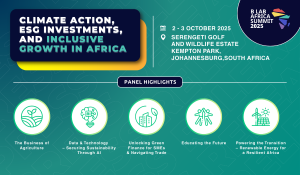As the world celebrates World Teachers’ Day on October 5th, it’s time to shift the spotlight from appreciation to action. In today’s rapidly evolving digital landscape, teachers face unprecedented challenges and opportunities in preparing students for a future shaped by technology. To meet this moment, we must invest in the people at the heart of education, the teachers.
Empowering teachers with cutting-edge digital literacy, ongoing professional development, and strategic support is no longer optional, it’s essential. This means rethinking curriculum design, aligning policy with innovation, and building systems that nurture continuous growth.
“On this global day when teachers are recognised, we reaffirm our commitment, to equip every teacher not just to adapt, but to lead in the digital-first classroom. Empowering teachers to thrive, ensures that students are able to soar,” says Dr Michael Naidoo, School Manager of the MANCOSA School of Education (SOE).
He emphasises the importance of the education sector embracing technology and ensuring that teachers are equipped for a digitally dominant future.
Digital Competencies
Given the growing trend towards technology-based education and teaching models, must possess the digital skills necessary to educate learners effectively.
Dr Naidoo points out that, in today’s classrooms, digital competencies are no longer optional, they are foundational and critical to effective teaching and learning. “Teachers need to master, not just the technical use of digital platforms, but also digital pedagogy. This includes the ability to design, deliver, and assess learning effectively using technology. Competencies such as navigating Learning Management Systems (LMS), integrating multimedia resources, applying data analytics to track learner progress, and maintaining cybersecurity awareness are critical,” says Dr Naidoo. He adds that teachers must be equipped to foster digital citizenship among learners, ensuring safe and ethical online engagement.
He points out that these skills are at the core of the SOE’s approach to education. These competencies are prioritised through the iTEACH labs, where practical, hands-on exposure to digital tools is central to teacher preparation. “Beyond the basics, the emphasis is on developing adaptability so that teachers can evolve with technological advancements. By embedding digital fluency into teacher education from the outset, institutions like ours ensure that teachers graduate with the resilience to thrive in technology-driven classrooms,” says Dr Naidoo.
Professional Development
Teachers are operating in a world where skills development is no longer stagnant. While teachers were always required to broaden their professional skill set to learn new teaching techniques, the pace of change has accelerated exponentially over the past five years.
Professional development is increasingly shifting from a one-size-fits-all approach to a more context-specific model. For urban teachers, initiatives often focus on integrating advanced edtech and implementing data-driven instruction. Whilst rural teachers may need foundational training in connectivity, basic ICT skills, and mobile learning solutions. Programs are also becoming modular, enabling teachers to access micro-credentials and short courses tailored to their grade level and subject needs. Additionally, hybrid and online platforms allow continuous learning without geographic barriers.
“By incorporating subject-specific digital tools, teachers of mathematics, languages, or sciences can receive targeted upskilling. Importantly, professional development now recognises diversity in teacher experience, ensuring inclusivity and relevance. This approach empowers teachers at every stage of their careers to remain current in a rapidly changing educational environment,” says Dr Naidoo.
Addressing the Digital Divide
While South Africa is catching up with the rest of the world in terms of access to technology-based education, a significant challenge in the country arises between urbanised schools and rural/per-urban schools.
The South African education system is facing yet another situation of inequality due to access to connectivity and the funding required to ramp up schools to the level where they become fully digitised. Schools in urban areas will have a distinct advantage over those in peri-urban and rural areas.
“This is not only a problem when it comes to accessing education, but it is also a problem when it comes to upskilling teachers. Many high school graduates who aspire to be teachers come into MANCOSA with varied digital skills, and it is our responsibility to level the playing field,” says Dr Naidoo, who adds that, despite the disparity in digital skills , the SOE still produces teachers who can adapt to the modern digital classroom.
“The digital divide remains one of South Africa’s most pressing educational challenges. However, schools and institutions are addressing the issue through a combination of infrastructure provision and targeted training. For rural teachers, initiatives often begin with mobile-first solutions that leverage smartphones to bridge access gaps. Partnerships with NGOs and government departments have facilitated device distribution and subsidised internet connectivity. These partnerships have also supported the development of offline learning tools for areas with poor coverage,” says Dr Naidoo, who adds that the SOEs programmes emphasise scalable solutions that can function in both low- and high-resource contexts. Training is contextualised, ensuring that teachers in rural schools are not left behind by digital transformation. By advocating for context-based and adaptive training, tertiary institutions are gradually narrowing the overall digital divide.
A Vital Corner Stone
MANCOSA was established out of a necessity to provide quality tertiary education to communities that were denied this during apartheid This includes students who could not afford to invest the time and money required to acquire degrees at public universities that were also becoming increasingly oversubscribed as access to these institutions was opened to all races.
MANCOSA has always been at the forefront of innovative education, designing its courses to address some of the country’s biggest challenges. The SOE is tackling both legacy challenges and the growing tech boom through technology-first courses and innovative teaching methods.
In addition to the interventions already discussed, Dr Naidoo points out that the MANCOSA believes that future-ready teachers must be more than digitally competent. They must also be leaders and innovators within their communities. To achieve this, the institution integrates entrepreneurial thinking into its curriculum. “This encourages graduates to design solutions for local challenges such as resource scarcity or digital access. Leadership development is embedded through project-based learning and exposure to real-world educational innovation. Adaptive skills are cultivated through interdisciplinary training,” says Dr Naidoo.
In the training, students engage with STEM subjects and problem-based scenarios that mirror the unpredictability of modern classrooms. “Additionally, MANCOSA instils values of resilience, creativity, and social responsibility, which prepare graduates for diverse teaching contexts. MANCOSA ensures, holistically, that its graduates are competent teachers, but also change agents, who can drive educational transformation,” says Naidoo.
Investing in The Future
As South Africa embraces the digital future of education, tertiary education providers stand out as a beacon of innovation, equity, and empowerment. By prioritising digital competencies, contextual professional development, and scalable solutions to bridge the digital divide, we can create the teachers of tomorrow who will add significant benefit to the South African education system.
MANCOSA is cultivating a new generation of teachers equipped to lead with confidence and creativity. These teachers are not only prepared to navigate the complexities of modern classrooms, but they are also empowered to transform them. With continued investment, collaboration, and visionary leadership, the future of education in South Africa is bright, inclusive, and increasingly driven by digital technologies. As we celebrate World Teachers’ Day, we look ahead with optimism, knowing that empowered teachers will shape empowered learners and a stronger society.
About The Author
![]()
Subscribe To Our Weekly Newsletter










